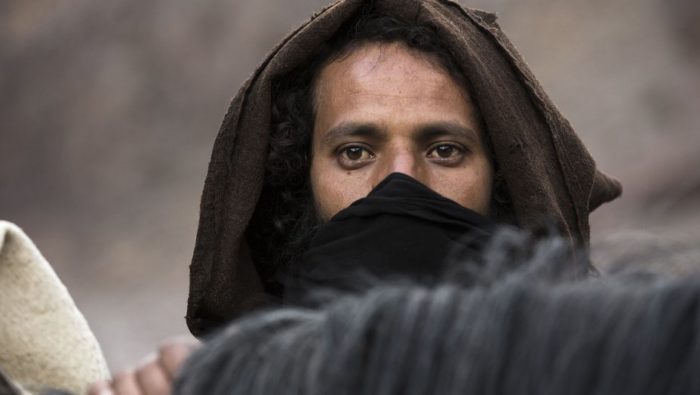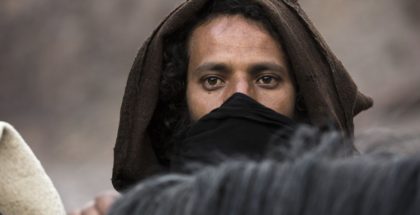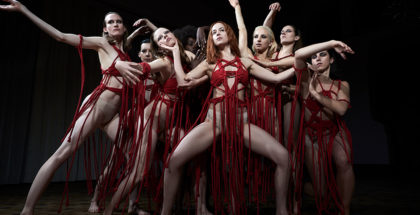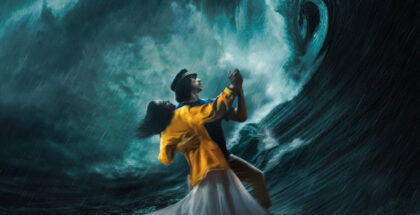Interview: Oliver Laxe talks Mimosas, movies and MUBI
Matthew Turner | On 27, Aug 2017
This weekend sees Cannes winner Mimosas arrive in UK cinemas.
Oliver Laxe’s visually stunning, transcendent western was snapped up by subscripton streaming service MUBI earlier this year. Set in a time gone by, it follows a band of travellers cross the Moroccan desert to bury an elderly sheikh. While most of the group dissolves, two travellers contemplate robbing the group before a change of heart leads them to take the sheikh’s body on path to its rightful home. The introduction of a third man from modern times offers to help escort the caravan on its arduous journey.
Structured in chapters based on Sufi prayer positions, the film’s subtle procession through rugged landscapes is presented as a phantasmagorical journey through time and place.
As MUBI teams up with ICA to release the movie on the big screen, before it arrives online as a MUBI exclusive, we catch up with the Morocco-based Spanish filmmaker to talk westerns, streaming and striving for transcendence.
How would you describe Mimosas?
I like to say that it’s a film about physical adventures and also metaphysical adventures. It’s a film where the audience can be engaged in a very regular way, with the suspense of the film – the caravanners are persecuted by bandits, the mountains are very difficult, they get lost – and I like the audience to experience this kind of film, to feel that they are climbing huge mountains and braving large deserts. But at the same time, I like to say that it’s also a metaphysical adventure, because there is also a kind of transcendence that I think the audience also wants. I think that there is an experience of mystery, of strangeness. There is a need, between something clear and something more mysterious in this film, and I like that.
Do you see any connection between this and Ben Rivers’ The Sky Trembles and the Earth Is Afraid and the Two Eyes Are Not Brothers? You shot on the same location and you acted in Rivers’ film, but do you see any connection thematically?
First of all, both films wanted to deal with the genre of Westerns. And also, I feel Ben Rivers is like a brother, in a way, he’s a filmmaker who knows what an image is, he’s excited by images, he works first with the image, of a film. And I feel an affinity with that, I like that.
Were there any other key influences on the film? It reminded me of Herzog’s films, for example.
Herzog, more than the films, was the attitude. I feel very inspired by his attitude of looking for the big meaning, always. I was also inspired by films like Tarkovsky’s Andrei Rublev, Dreyer’s Ordet, Rossellini’s The Flowers of St. Francis, but also by very popular Westerns, like John Ford’s Westerns, or Sam Peckinpah’s or Monte Hellman’s, those 1970s American movies, metaphysical Westerns from this time. But I wasn’t only influenced by cinema – the creative process of Mimosas took five or six years, so a lot of travelling and meeting people and exploring the themes of the film. I was influenced by a lot of writing too.
Such as?
A lot of Iranian poets, for one. There is this archetype in the movie of the Wise Fool, who’s very clever in his madness. So that’s an archetype that can be found in many books – in Don Quixote, in Dostoyevsky’s The Idiot – it’s an archetype that’s very common in literature and we explored that too.
Can you talk a little about the casting process? You’ve worked with Shakib Ben Omar before…
The casting is like when you’re with your friends: you are touched by people that have something and you try to explore what touched you, from these people, to analyse what is beautiful. And I tried to reproduce that on film. I met [the actors] over the course of the last 10 years, in Morocco, and I was thinking of them while I was writing. I knew them before I wrote the script, so, in a way, I wrote them as themselves, even though it was a very classical script. And Shakib has an innocence that I really liked, an innocence that is almost other-worldly, I think. And Ahmed Hammoud, he was the mystery, this silence that he has, that speaks. And with Said Aagli, it was his ethics, he has ethics in his glance, the way he looks, the way he speaks, the way he smokes, every gesture he has expresses ethical values and faith. And also, Ikram Anzouli was a girl that I met when I was working at a school – she also has a very expressive glance and a very expressive silence.
How many were non-professional actors?
Most of them. Only Ahmed had worked a little bit in the theatre, the others had not acted before. Shakib Ben Omar had worked with me before, but I made them like they are, in the film, I tried to expose their souls, to catch their souls with the images. So it’s not so difficult when you adapt yourself to the real person. There was always a challenge, that was very frustrating, of the difference between being with the person or being with the character, being more on the script or more on them, trying to mix both sides. It was difficult, but there was always something there.
The landscapes are incredible. Can you talk about the challenges with the locations, and also their appeal?
I lived in that area [the Atlas mountains in Morocco] for four years, so I had the opportunity to walk a lot, to get to know these places. It was part of the pleasure of making this movie, for me, to explore the south of Morocco. My producer wanted me to make this movie near the city, not so far away, but I knew it was important to make a kind of pilgrimage, for the crew, for the team. I think you have to earn things – if you want life to give you something, in your life, or if you’re making a movie, you have to earn it, you have to deserve it. So I wanted to push the crew to a kind of limit, and obviously it was very, very difficult to make this movie – the conditions, sleeping in the mountains all the time. So I knew that these mountains would be reflected in the movie, not just in the images, but in the energy, as well – those limits would be expressed in the gaps between the images, more than in the images themselves. People obviously look at the landscapes and say that nature is a character, and I like that, but for me, nature was the music of the set for the characters, in the snow, in the water, in the sand, in the storm. We worked with the sound of the steppes in all the places, and there was a kind of acceptance of the path, of the strength of the caravan, an acceptance of the destiny they have.
What was the hardest thing to get right?
The thing is, that to make a very good Western, generally, you need time, and the script was like, eight weeks, but we only had five weeks. The most difficult thing was to do it in five weeks, and we had a lot of production problems, with the weather, we made some mistakes, a lot of days we could not shoot. So that was the most difficult thing, the stress – I mean, you want to make a sacred film, but most of the time you are working in an industrial way, with a lot of people. That was probably the most difficult thing, to try to keep the soul of the film, even if the way to do that was sometimes contradictory to the spirit of the film.
How important are companies like MUBI to the future of independent film?
I come from a country where it’s very difficult to make independent cinema – the institutions are not very responsible. So I think that it’s changing the paradigm. I think things are changing now because they have to change and I’m going to have to adapt. The only thing I can say is that I think that the cinema is important, too. The only thing I’m afraid of is losing the cinemas, the movie theatres – we have to keep the theatres in life. There is something mysterious and strange that happens in the cinema, in that black room. There is a mysterious relationship between images and the human body. So that’s the only thing I’m afraid of, that these temples might disappear. But that doesn’t mean I don’t like Netflix – we have to look for a balance, like always.
Do you use VOD services at all yourself?
I don’t. I try not to use the Internet too much. I have my email and it’s too much. I probably will in the future, but I’m a filmmaker – my life isn’t very structured. I haven’t had a house for the last two years, so it’s difficult to have habits, you know, like watching movies or having a channel or something! I like watching movies a lot, with the family, but also I fall asleep all the time when I watch them.
Did you watch any specific movies for this film?
Yes, a lot. I don’t watch too many movies, but the movies I watch, I watch them many, many times. There are like 10 masterpieces that I like to rewatch, to study, and I think with Mimosas, you can tell there is a dialogue with some masters [classics] – I’m not saying that the film is at the level of the masters, but it’s trying to talk with tradition in a way, you know?
Where does the title come from?
At the beginning, we wanted to shoot in a cafe in Tangier that was called Mimosas, but we had no budget to travel to Tangier – we were very deep in the desert – but we kept the name anyway. We didn’t find a better name. And I like it, it’s very romantic, it’s very musical. “Mimosas”. And it’s also a name that you can say in English, in Arabic, in Spanish, in French – Mimosas is a very international word. It’s a bastard name, like the film is a bastard, in a way; it’s a film that’s very de-territorialised. It’s not a Spanish movie, it’s not a Moroccan movie, it’s a Western, Muslim – I think it’s a lot of things, you know? Like culture – culture has no country, culture is made by mixtures and exchanges. It’s a bastard thing.
And finally, what’s your next project?
I’m working on two projects. One is with firefighters in my region, in Galicia, it’s a film about fire, about a pyromaniac, an arsonist. And at the same time I’m working on a psychedelic road movie about a group of ravers who are looking for a party in Morocco. The name of the film is After – they are looking for an after-party. It’s a kind of road movie adventure film, in a way, but with transcendence, we hope.
Mimosas is available to rent on MUBI UK.






















